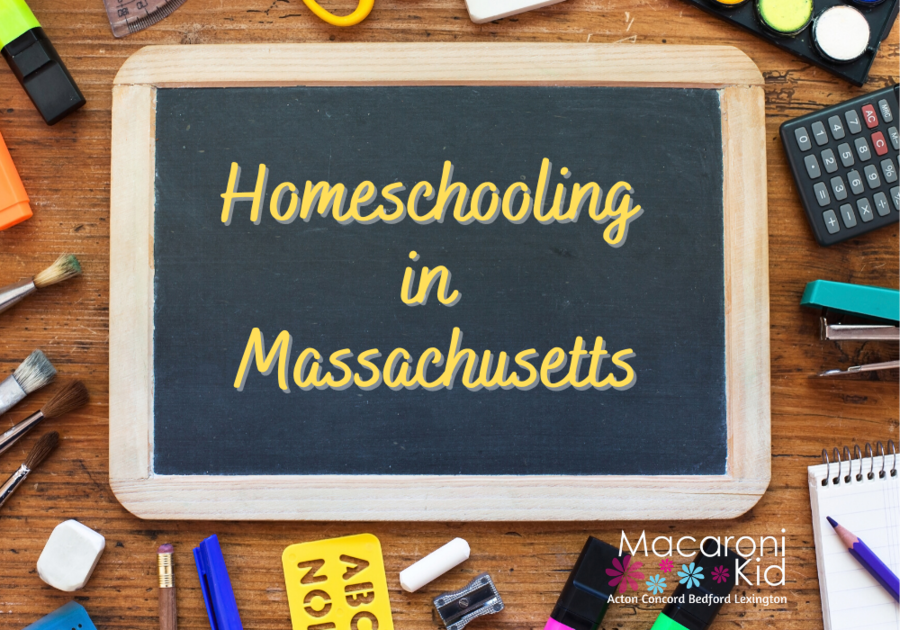Second in a series on homeschooling. Read the first article at "Homeschooling: What Is It, Pros & Cons, and Methods". Subscribe to our weekly newsletter to receive the next articles in your email.
For families researching homeschooling as a possible option this fall, it is essential to know what is required of you as a homeschooling parent. It’s not necessarily difficult, and there are many resources to help answer questions. This article summarizes the basic requirements with links to resources and organizations. Please make sure to do your own research as well and consult homeschooling organizations to help you clarify any questions.
Mandatory Ages for School Attendance
Children must attend school between the ages of 6 and 16 according to the Massachusetts Department of Elementary and Secondary Education (DESE). This schooling may take the form of public school, charter school, private school, Commonwealth Virtual School, or homeschooling.
Children must begin school in September of the calendar year in which the child turns six years old (603 CMR 8.00). This means that a child who is six or will be six by December 31, 2020 is required to attend school. Please note that this has nothing to do with grade level or when districts allow students to begin Kindergarten. Compulsory age is often confused with kindergarten cutoff dates. If you plan to homeschool a child who will be six before the end of 2020, you would need to submit an education plan as described below. If your child turns six in 2021, you would not need to submit any paperwork until the fall of 2021.
Some homeschooling families stop submitting education plans once their children reach the age of 16 because it is no longer required. Other families continue to submit education plans especially if the teens are in a dual enrollment program at a community college or are interested in pursuing a college education. For these purposes, some families continue to submit the homeschooling paperwork until the teens complete their high school years.
Homeschooling Requirements
Massachusetts is an approval state which means that, although it is your right to homeschool your children, the school district is responsible for approving home education plans that meet the necessary requirements.
The requirements for homeschooling come from the decisions in two landmark cases, Care and Protection of Charles & Others (commonly called Charles) and Michael Brunelle v. Lynn Public Schools (commonly called Brunelle), that set precedent related to homeschooling in Massachusetts. Charles lists the requirements, including an education plan, which families must complete to be approved to homeschool. Brunelle added that families are not required to have home visits by the school to be approved for homeschooling. It is important for homeschooling families to be familiar with their requirements under these case laws.
Education Plan
An education plan is the document that you submit to the school district that briefly outlines your homeschooling plan for the year. Sample education plan templates are available from AHEM and MHLA. Most families use these templates to be sure that they include all of the required information. According to Charles, your written education plan must include the following:
- A list of subjects you will cover that “equals in thoroughness and efficiency” that of the school (G.L. c. 76 Section 1 and G.L. c. 71 Section 1)
- A general or specific list of resources you may use to teach the subjects listed. Homeschoolers are not required to use a specific curriculum or to cover material on the same schedule or at the same pace as the public school.
- A general statement of hours. Massachusetts requires a minimum of 180 days of school and at least 900 hours of instruction for elementary students and 990 hours for secondary school students. Your schedule does not have to match that of the school day. Education can happen on a schedule that works for your family. It is not hard to provide the equivalent of 180 days with homeschooling since learning happens throughout the day.
- A general statement of qualifications of the parents. According to Charles, parents do not need any particular background or education to homeschool their children.
- The method you’ve chosen as a form of evaluation at the end of the year. Charles allows for forms of evaluating a student’s progress other than standardized testing. In your education plan, you list your chosen form of evaluation from the following:
- Progress report: A simple report that shows a student’s progress in each of the listed subjects.
- Dated work samples: A few representative pieces of work from different subjects throughout the year.
- Standardized testing: This testing would be arranged for by the parent. Many families use the California Achievement Test from Academic Excellence. Homeschoolers do not take MCAS tests.
When Do I Send My Education Plan?
If you know that you want to homeschool next year, it’s helpful to send your education plan before the school year starts so there is enough time for your paperwork to be approved. Children who do not have an approved education plan in place could be marked as truant if not in school. Education plans can be submitted at any time of the school year.
Where Do I Send My Education Plan?
Education plans are often sent to the superintendent’s office but some districts have a designated office that handles homeschooling paperwork. Check your school’s website to determine where you should send your education plan. Families typically use one of three methods to submit their education plans: email, mail with return receipt, or bringing a copy to the superintendent’s office and asking for a stamped copy for you to keep. Make sure to keep a copy of your paperwork on file for your records.
Follow Case Law
First time homeschoolers often think that the best source of information regarding homeschooling is their school district but this is incorrect. Homeschooling requirements are statewide and set by case law, not by individual school districts. Sometimes schools ask for information that homeschoolers are not required to provide. Unfortunately, providing too much information may set new expectations and can make things harder for other homeschooling families who are following the rules set out in case law.
If the district does not approve your education plan or asks you for more than is required by case law (see the Education Plan section above for the list of items your education plan must include), reach out to homeschooling organizations such as AHEM and MHLA for assistance. It’s also useful to find support within the homeschooling community if cases like this arise.
It sounds complicated, but it’s really not that difficult to homeschool in Massachusetts. Make sure you understand the requirements of homeschoolers and know where to turn if you have any questions. The following additional resources will be beneficial for your research:
- Massachusetts Homeschool Law from the Advocates for Home Education in Massachusetts, Inc. (AHEM)
- FAQ from AHEM - includes a Q&A about homeschooling requirements and education plans
- Quick Overview of Requirements from the Massachusetts Home Learning Association (MHLA)
- Public Documents from MHLA - includes regulatory documents and more
- Massachusetts Laws from the Home School Legal Defense Association
- Massachusetts Homeschoolers Connection - This Facebook group is a helpful resource for asking questions, learning about homeschooling materials, and connecting with other homeschoolers
For upcoming online presentations related to homeschooling, please check out the following:
- Advocates for Home Education in Massachusetts, Inc. (AHEM) news/events
- Massachusetts Home Learners Association (MHLA) presentations
For more information on homeschooling, see our full Article Series:
- "Homeschooling: What Is It, Pros & Cons, and Methods" -- why homeschool, drawbacks, benefits, and different approaches
- “How do I Homeschool in Massachusetts?” -- the Massachusetts laws affecting homeschoolers and the responsibilities of homeschooling families
- "Homeschooling: Choosing Curricula" -- Sourcing materials
- "Socializing and Connecting While Homeschooling" -- Local homeschooling co-ops, classes, and groups
- "Homeschooling Tips from an Experienced MA Homeschooler" -- tips, cost, and fun ideas
Emily Classon is a homeschooling mom in Tyngsboro. She and her daughter have homeschooled for the last five years. She has a Masters in Information and Library Studies degree and worked in public libraries for over 20 years. Emily also teaches Zentangle®, a meditative art form.
Macaroni Kid Acton-Concord-Bedford-Lexington is a free weekly newsletter and website focused on fun events and information for local families.
We gather together all kinds of local family events and activities each week, and add useful information about classes, family-focused businesses, book and product reviews, recipes, crafts, school and camp guides and more. We proudly serve thousands of families in Acton, Bedford, Boxborough, Carlisle, Concord, Lexington, Lincoln, Maynard and other surrounding communities.
Subscribe today to receive our email newsletter every Thursday!



